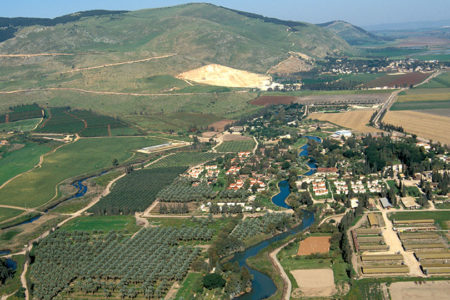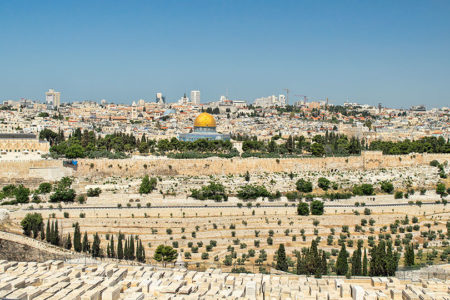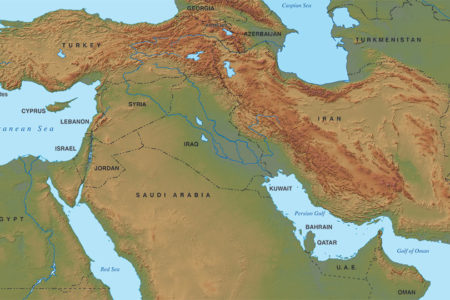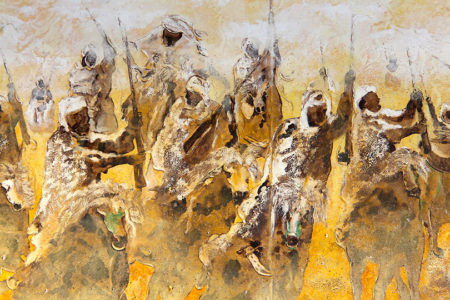Worship in the Kingdom
Zechariah 14:16–21
Editor’s Note: This article concludes David Levy’s 18-part series on the book of Zechariah, which began with our March/April 2004 issue. In our next issue, he will begin a series on the book of Jonah.
The Messiah’s Second Coming is the dominant theme of chapter 14. His return will be sudden, unexpected, visible, personal, powerful, glorious, and triumphant. When He steps on the Mount of Olives, it will split apart (v. 4), altering the topography of Jerusalem and the surrounding area in preparation for the Kingdom. Peace will settle on the earth, as Jesus the Messiah establishes His Kingdom reign and rule.
Zechariah’s concluding section emphasizes that both holiness and worship will characterize and permeate Christ’s Kingdom on Earth.
Reverence of Christ
Gentiles living in the Kingdom will be required to attend the Feast of Tabernacles in Jerusalem to worship the Lord:
And it shall come to pass that everyone who is left of all the nations which came against Jerusalem shall go up from year to year to worship the King, the Lᴏʀᴅ of hosts, and to keep the Feast of Tabernacles (v. 16).
Who are these Gentiles required to attend the Feast of Tabernacles? They are the “sheep” that will be placed at Christ’s right hand. After His return, Christ will judge the nations that survive the Great Tribulation to determine who from among the Gentiles will enter the Kingdom. (See Matthew 25:31–46.) This judgment of the nations (not to be confused with the judgment seat of Christ or the Great White Throne judgment) is mentioned in Matthew’s Gospel:
When the Son of Man [Christ] comes…He will sit on the throne of His glory. All the nations will be gathered before Him, and He will separate them one from another….And He will set the sheep on His right hand, but the goats on the left (vv. 31–33).
This judgment will take place in the Valley of Jehoshaphat between the Eastern Wall of the Temple Mount and the Mount of Olives (Joel 3:2, 12).
The “sheep” are redeemed Gentiles who will be placed at Christ’s right hand, denoting a place of honor and blessing. They will inherit the Kingdom prepared for them from the foundation of the world. Evidence of their regenerated nature will be their kind treatment of the Lord’s brethren, the Jewish people, during the Great Tribulation. These righteous Gentiles are amazed that Christ honors them for ministering to Jewish people during this time of Jewish suffering. Only redeemed Gentiles, along with redeemed Jews, will be allowed to enter the Kingdom (Mt. 25:33–40).
Unlike the “sheep,” the “goats” are cursed and condemned to everlasting fire prepared for the Devil and his angels. They, too, will be astonished at the Lord’s verdict. He will inform them that their hostility toward and physical mistreatment of Jewish people during the Tribulation indicated they were unsaved (unregenerate). These unsaved Gentiles will be executed after this judgment (vv. 41–46). No unrighteous person will enter the Kingdom.
The redeemed Gentiles will make an annual pilgrimage to Jerusalem (the world’s capital) to pray and “worship the King, the Lᴏʀᴅ of hosts” (literally, “Lᴏʀᴅ of armies,” Zech. 14:16). The post-exilic prophets used the phrase Lᴏʀᴅ of hosts to describe an all-powerful God who will accomplish what He has decreed. Although no nation will maintain an army during the Millennial Kingdom, each nation will, however, still maintain its identity (Isa. 2:4; Mic. 4:3).
In that day, the world’s population will worship “the Lᴏʀᴅ” as sovereign King over all the earth (Zech. 9). He will be loved and adored as the one and only true God. Gentiles who go to Jerusalem will grasp the corner of a Jewish priest’s garment, wanting to be taught the Word of God by him (Isa. 61:6; Zech. 8:22–23).
Religious Celebration
Gentiles will worship the Lord at the Feast of Tabernacles (14:16). Two questions need to be addressed at this point. What is the Feast of Tabernacles, and why do the Gentiles go to Jerusalem to celebrate it?
The Feast of Tabernacles, or Ingathering, as it is sometimes called, is first mentioned in Leviticus 23:33–44. It is the seventh and final feast that Israel was commanded to keep, and the third of three feasts that Jewish men were required to attend annually in Jerusalem.
In Hebrew it is called Sukkot, meaning “booths.” It was named for the temporary huts that housed the Israelites during their 40 years in the wilderness (v. 42). The feast commences five days after the Day of Atonement (Yom Kippur), in September or October, and lasts for seven days, during which time Jewish people are supposed to dwell in booths they have constructed for the holiday. Sukkot is to be celebrated at the end of the growing season, after the ingathering from the threshing floors and winepresses (Ex. 23:16; Dt. 16:13).
During the feast, three branches (palm, myrtle, and willow) are bound together in what is called a lulav, which is held in one’s right hand. A citron, called an etrog, is held in one’s left hand. A Jewish person then recites a blessing over his sukkah (“booth”) on each of the seven days of the feast and waves the lulav in every direction.
In biblical times the Feast of Tabernacles was a time of rest, praise, and giving of thanks; and it was celebrated with great joy for the harvest of grain and wine gathered at year’s end.
Then why do redeemed Gentiles need to celebrate this feast in Jerusalem?First, the Lord commands them to do so. Second, it will be a joyful time of worship and praise to the Lord for the fruitful harvest that He provides (cf. Amos 9:13). Third, it will also be a time when the world recognizes and worships Jehovah as King of the earth. In celebrating this festival, the nations will express their submission to Jehovah as the only true God of the universe.
Rain Control
Nations existing during the Kingdom will be required to send representatives to Jerusalem to worship the Lord at the Feast of Tabernacles. Those nations that are remiss in their obligations or rebel will pay dearly for their disobedience. Zechariah prophesied,
And it shall be that whichever of the families of the earth do not come up to Jerusalem to worship the King, the Lᴏʀᴅ of hosts, on them there will be no rain (v. 17).
Lack of rain will bring hardship, and the entire world will know that the country disobeyed the Lord. When the Israelites refused to obey God’s commandments, He punished them by withholding rain (Dt. 11:17; 28:23–24; 1 Ki. 17:1; Hag. 1:10–11).
Egypt is specifically singled out, should it not send representatives to the Feast of Tabernacles:
If the family of Egypt will not come up and enter in, they shall have no rain; they shall receive the plague with which the Lord strikes the nations who do not come up to keep the Feast of Tabernacles (v. 18).
Why Egypt is specifically mentioned is unknown. It should be pointed out that Egypt was not dependent on abundant rain to water its crops because it drew the necessary water from the Nile River. Consequently, Egypt might think it would escape judgment. But God has another judgment in store for the nation; it “shall receive the plague.” Egypt knows what it means to experience plagues (Ex. 7:14—12:12, 29–30).
Prof. Eugene Merrill’s comments are appropriate regarding God’s punishment of both Egypt and the nations:
Egypt in the Bible is frequently a type of the world at large (Isa. 27:13; Rev. 11:8). Here it is not distinguished, therefore, from the nations just mentioned but appears as a synonym for them….Not only Egypt, but all the nations who do not go up to celebrate the Feast of Tabernacles, will experience the severest repercussions. The prophet views this extreme measure not as a whimsical or arbitrary act of God but as a “punishment” (v. 19). The word here is literally “sin”…but by use of the metonymy of effect he speaks of the result in place of the cause. That is, the plague is the aftermath of sin in the sense that it is its punishment. The sin is of the most egregious kind, for in the covenant context of the passage it is nothing short of rebellion and repudiation of YHWH’s dominion.1
Righteous Consecration
Only redeemed people—those who were made righteous through receiving Jesus the Messiah—will enter the Kingdom. Righteousness will prevail because Satan is bound in the bottomless pit (Rev. 20:1–3), and the Lord has cleansed the world of wickedness.
Holiness will characterize every area of the Kingdom, both secular and sacred. Zechariah emphasized this fact in the concluding verses of his prophecy:
In that day “HOLINESS TO THE LORD” shall be engraved on the bells of the horses. The pots in the Lᴏʀᴅ’s house shall be like the bowls before the altar. Yes, every pot in Jerusalem and Judah shall be holiness to the Lᴏʀᴅ of hosts. Everyone who sacrifices shall come and take them and cook in them (vv. 20–21).
Zechariah pointed out that the phrase HOLINESS TO THE LORD will be engraved or stamped on the most mundane objects, such as the bells on the horses and the pots or bowls used in the Kingdom Temple. The engraving will declare to all that the items are fit for Kingdom use. Everything used in the Kingdom administration will be considered holy to the Lord. Even the cooking utensils of people coming to Jerusalem to worship and study will be dedicated.
Zechariah closed his prophecy by saying, “In that day there shall no longer be a Canaanite in the house of the Lᴏʀᴅ of hosts” (v. 21). In biblical times, the word Canaanite referred to a person who was profane, unclean, ungodly, or—referring to merchants—dishonest. In Hosea 12:7, the word Canaanite was used of an Israelite who cheated in business. Canaanite practices were so wicked that God decreed the Canaanites’ annihilation in order to rid the land of contamination. This type of person will forever be banished from the Kingdom.
Zechariah’s name means “Jehovah remembers,” a reminder that God will not forget His covenant commitment to Israel. The prophet Isaiah beautifully phrased God’s everlasting love and commitment to His ancient people:
Can a woman forget her nursing child, and not have compassion on the son of her womb? Surely they may forget, yet I will not forget you. See, I have inscribed you on the palms of My hands; your walls are continually before Me (Isa. 49:15–16).
Zechariah’s prophecies reach far into the future. They are an ongoing testimony to Jewish people in every age that God does not forget His covenant promises to Israel. Zechariah’s prophecy began with God’s call for Israel to repent of its sin (1:1–6), and it concludes with a promise of Israel’s redemption, restoration, and a return to righteous living. Jewish people can take hope and be assured that God will fulfill His covenant promises to Israel.
ENDNOTE
- Eugene H. Merrill, An Exegetical Commentary: Haggai, Zechariah, Malachi (n.p.: Biblical Studies Press, 2003), 318–319.







